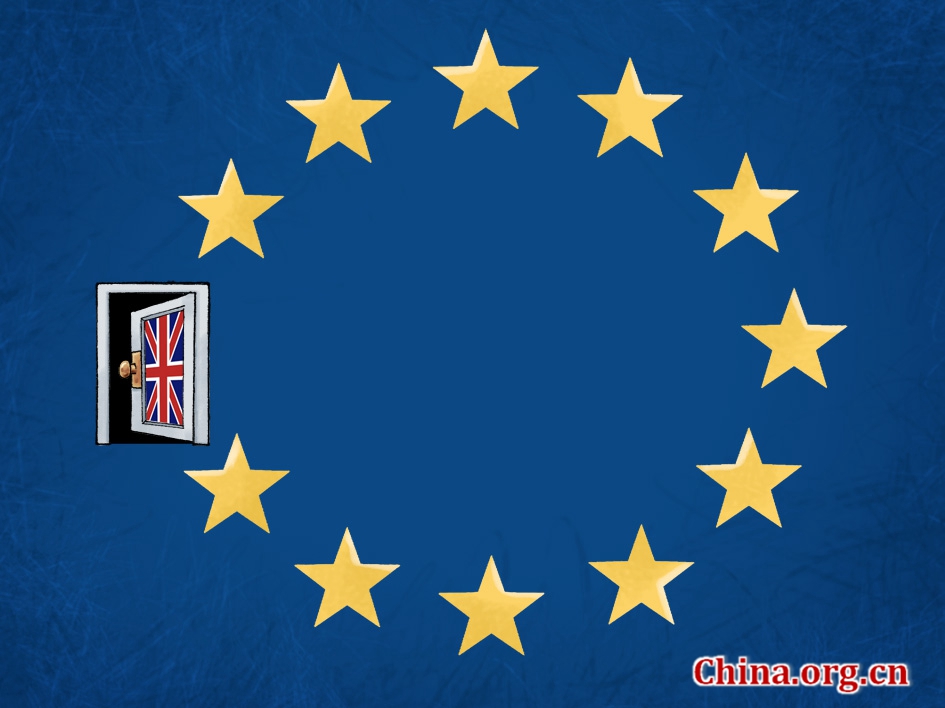Regarding the British referendum
- By George N. Tzogopoulos
 0 Comment(s)
0 Comment(s) Print
Print E-mail China.org.cn, June 10, 2016
E-mail China.org.cn, June 10, 2016
|
|
| By Zhai Haijun. |
Since the beginning of the European debt crisis in 2009, a certain fear has dominated political and public debate in Europe: That a potential exit of a country from the Eurozone – mainly Greece – might cause a metastasis effect, possibly leading to the zone's disintegration. Even in July 2015, when the possibility of a Grexit was higher than ever, the scenario was averted even though the Eurozone was economically prepared for Greece's departure.
Approximately one year later, Europe – this time the entirety of the EU – is facing a more significant challenge. On June 23, British citizens will decide the European future of their country. A "NO" vote in the referendum would signal the end of EU membership for the U.K. At the time of this writing, some opinion polls have started to show Brexit leading. The Guardian, for instance, presented the results of a new survey conducted by ICM outlining the change in public preference compared with previous months. It is questionable whether this shift will endure until the day of the referendum, but it is indicative of the general challenges involved in predicting a final result.
When British citizens are asked about their principal concern regarding the referendum, they focus mainly on the economy. In this regard, Prime Minister David Cameron might have an advantage due to his personal credibility as well as the existence of various reports suggesting that a Brexit would seriously damage the country's economy. Subsequently, undecided voters will perhaps feel pressure to vote "YES" in order to avoid the risk of negative economic consequences.
From another perspective, however, challenges such as immigration along with the traditional Eurosceptic stance could work in favor of a vote to leave. More importantly, there has recently been an inclination of citizens in various Western countries to abandon mainstream political parties and politicians to support new ones who are popular for their unorthodox and atypical approach to politics.
A vote to stay will guarantee the U.K.'s continuity in the EU. By contrast, a "NO" vote will certainly lead the U.K. into an unknown political and economic landscape. Uncertainty will dominate Britain and Europe until it becomes clear whether a new compromise between London and Brussels can be found.
The U.K. has proven to be a powerful state throughout its history. Taking into account the fact that it has preserved its national currency and is not a member of the Schengen Zone, a Brexit might prove to be difficult at first, but not unmanageable. Consequences such as the devaluation of the pound in relation to other major currencies, the reduction of foreign direct investment, a drop in the stock market and cuts in wages will be mitigated in the medium term. What is more important is to monitor what kind of rights foreign employees will be allowed to keep and whether or not foreign companies will withdraw from the country.
Regarding the possible domino effect of other countries leaving the EU once one has, two scenarios are possible. In the negative one some EU countries – such as Sweden – might be prepared to follow the U.K. model and also leave while others – such as Greece – might be pushed outside the Eurozone for non-compliance with rules. But in the positive scenario, the EU will act quickly towards the formation of a political and fiscal union in order to efficiently respond to forthcoming challenges at the political and economic levels.
For the coming weeks, attention will be naturally directed towards the U.K. The British referendum, however, is not only an issue that affects the U.K. and Europe. In the U.S., for example, President Barack Obama has taken a clear position in favor of a "YES" vote. For its part, China is supporting the integrity of the EU, although it does not seek to become involved in the domestic affairs of the U.K. The stance of Washington and Beijing is logical, as a Brexit could temporarily jeopardize harmonious bilateral cooperation and would require a reconsideration of policies that are already in place. But after the initial shock, new opportunities can be created. This is the case for both the special relationship between the U.K. and the U.S. and the "new special relationship" between the U.K. and China, which are not dependent on the result of the referendum.
Dr George N. Tzogopoulos is a lecturer at the European Institute in Nice.
Opinion articles reflect the views of their authors, not necessarily those of China.org.cn.







Go to Forum >>0 Comment(s)